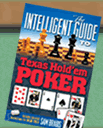Full Tilt Poker is committed to U. S. Players! Play at one of the busiest sites on the Internet in a cardroom that is both Windows and Macintosh compatible. |
| Full Tilt Poker |
| MACINTOSH Compatible Poker Rooms |
| Full Tilt Poker |
|---|
| Poker Stars |
| Absolute Poker |
If you have been paying close attention to the world of high
stakes tournament poker in recent months, surely you have noted a phenomenon
which is becoming harder and harder to ignore. Specifically, a broad swath of
poker fanatics of both amateur and professional status is switching their
attention away from no-limit holdem to the game of
Many in the poker community had predicted this turn of
events for some time. It is inevitable that when a variant like
While there is still quite a bit of life left in the
What to think of when switching games
What does all this mean, if you, like most people, have
devoted the majority of your attention in recent years to mastering
In particular, you will be interested to know what specific tips are worth bearing in mind in order to make the transition as smooth as possible.
Four Hole Cards
The sheer amount of number of calculations you will be
called upon to make immediately upon seeing your four hole cards sets
You will be even better off to find yourself in possession
of double-suited cards. On top of that potentiality, consecutive runners usually
indicate a solid starting hand. When playing a game of standard
Be sure to note that high-value pocket pairs do not hold
nearly as much potential in
All about the nuts
In the majority of situations,
Thus, having the nuts should be your ultimate goal. The second-best hand in contention is rarely going to get the job done. This is quite different from the situation when you play holdem poker.
At its core, you could say that
So called normal flops (as in two pair) aren’t particularly
solid, so you're better off not raising with less than aces or kings. By always
seeing the actual value of the cards as your most demanding priority, you
should be able to make a strong transition from

